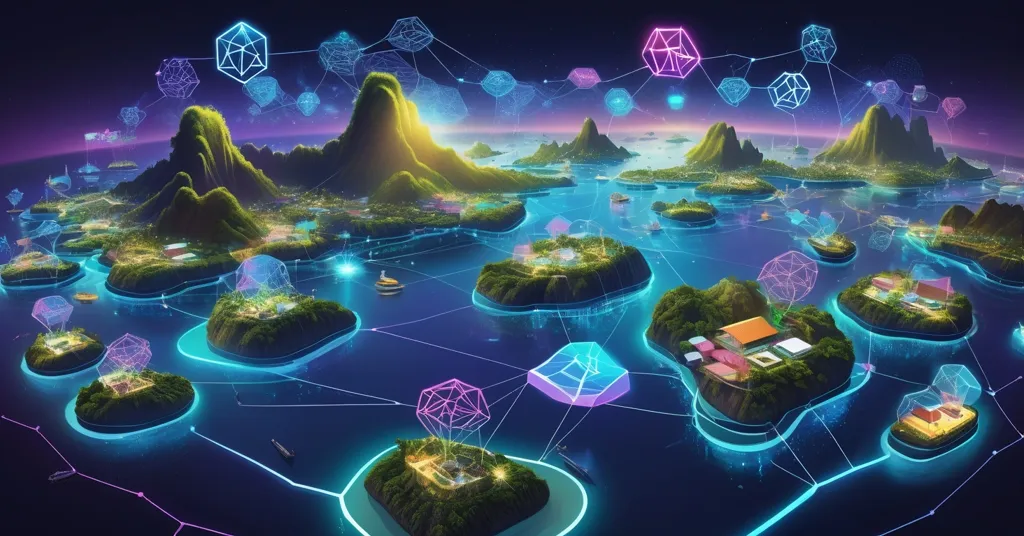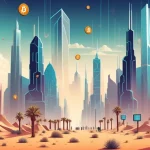Philippines to Lead ASEAN 2026 with Blockchain and Digital Innovation Focus

Philippines Sets the Stage for ASEAN 2026: Blockchain and Digital Innovation Take Center Stage
The Philippines is gearing up to host the 44th ASEAN Summit in 2026, and it’s not just another diplomatic meet-up. Under the leadership of Department of Trade and Industry (DTI) Secretary Cris Roque, the nation is poised to showcase a groundbreaking digital agenda, with blockchain, AI, and Web3 technologies at the forefront, aiming to redefine its role as a regional hub of innovation and inclusivity.
- Digital Showcase: Philippines to highlight blockchain, AI, and Web3 at ASEAN 2026.
- Connectivity Challenge: Digitalization to unite 7,600 islands for economic impact.
- Global Spotlight: Summit ties into U.S. diplomatic milestones amid regional tensions.
Uniting an Archipelago Through Digital Power
The Association of Southeast Asian Nations (ASEAN), a coalition of ten countries focused on economic, security, and cultural collaboration, holds biannual summits to tackle pressing regional issues. Hosting the 2026 summit offers the Philippines a pivotal opportunity to shift its global image from an emerging market to a tech-driven leader. With 7,600 islands making up its geography, physical infrastructure has always been a daunting barrier to connectivity and economic unity. Secretary Roque, speaking at the 51st Philippine Business Conference & Expo, laid out the stakes with unapologetic clarity, emphasizing that digital tools are no longer optional but essential for progress.
“We are 7,600 islands. The only way for us to get our message across, the only way for us to sell, and the only way for us to disseminate information and get things done is to go digital. We can’t wait anymore,” Roque asserted.
Under the summit’s theme, “The Future is Now: Unleash the Power of Digital Transformation,” the Philippines is banking on cutting-edge tech to bridge these geographic divides. Nearly 40% of Filipinos still lack reliable internet access, a gap that projects like the $288 million Philippine Digital Infrastructure Project aim to close by expanding broadband to remote areas. But it’s not just about laying cables—it’s about leveraging technologies that can fundamentally disrupt outdated systems. This is where blockchain comes in, and for good reason, it’s a perfect fit for a nation hungry for financial freedom and innovation, as seen in discussions around Philippines preparing to showcase digitalization at ASEAN 2026.
Blockchain: The Backbone of Inclusivity
For the uninitiated, blockchain is a decentralized ledger technology that powers cryptocurrencies like Bitcoin. It records transactions across a network of computers, ensuring transparency and security without the need for middlemen like banks. In a country where financial inclusion is a persistent challenge—especially for rural communities and micro, small, and medium enterprises (MSMEs)—blockchain offers a way to bypass traditional barriers. Imagine a farmer in a remote province using a smartphone app to access a decentralized finance (DeFi) platform, securing a loan without ever stepping foot in a bank. Or consider tokenized assets, where physical or digital goods, like crops or small business inventory, are converted into tradeable units on a blockchain, opening up new markets for the little guy. Insights into how blockchain impacts financial inclusion in the Philippines highlight the nation’s strategic position in this space.
The Philippines is no stranger to blockchain’s potential. It’s already a pioneer in blockchain gaming—think play-to-earn models like Axie Infinity, which turned gamers into earners during the pandemic. A young, tech-savvy population is driving Web3 innovation, the next iteration of the internet built on decentralized protocols that prioritize user control over Big Tech dominance. Roque’s vision is clear: tech must empower everyone, not just the corporate giants. “Innovation is within reach, and it must benefit everyone, not just the big players, but the smallest entrepreneurs whose ideas fuel our communities,” she stressed in recent interviews on blockchain and Web3 for ASEAN 2026. This ethos resonates deeply with the decentralization principles that Bitcoin maximalists hold dear—power to the people, not gatekeepers.
But let’s not slap on rose-colored glasses just yet. Blockchain’s potential is massive, but so are the risks if mishandled. Without clear regulatory frameworks, the Philippines risks becoming a playground for scams and hacks—something the crypto world has seen plenty of, with billions lost to DeFi exploits globally each year. And what if the government, in its push for digitalization, leans toward centralized solutions like a state-controlled digital peso? That would be a slap in the face to the freedom that blockchain and Bitcoin represent. The 2026 summit will be a proving ground—can the Philippines balance innovation with oversight, or will it trip over its own ambition?
Cybersecurity and Infrastructure: The Achilles’ Heel?
Rapid digitalization without robust defenses is like building a skyscraper on a swamp. Cybersecurity is a glaring concern, especially as blockchain and Web3 adoption open new points of vulnerability—think hackers exploiting weaknesses in digital wallets or smart contracts. The Philippines, with limited resources and awareness compared to global standards, is playing catch-up. Recent reports highlight that telecom monopolies like Globe and PLDT Smart, coupled with outdated spectrum management laws, are choking connectivity and innovation. If these gatekeepers keep bandwidth under lock and key, Web3 might as well stand for “Wait Three Years.” Community perspectives on platforms like Reddit discussing Philippines’ digital transformation for ASEAN 2026 echo these infrastructure concerns.
The government’s broader digital agenda, including AI to streamline services and apps like eGov PHSuper App for online governance, is ambitious. But ambition without execution is just noise. A successful ASEAN 2026 showcase hinges on addressing these infrastructure and security gaps. If not, the nation risks embarrassing itself on the global stage—or worse, exposing its citizens to cybercrime. A balanced approach, perhaps partnering with global blockchain security firms or launching public education campaigns, is non-negotiable. The question remains: will the Philippines build a fortress of innovation, or just a shiny target for hackers?
Economic Stakes: A Trillion-Dollar Dream
The economic incentives for going all-in on digital tech are staggering. S&P Global Market Intelligence projects the Philippines could hit a $1 trillion GDP by 2033, with the digital economy already contributing $35.4 billion (8.4% of GDP) in 2023. Hosting ASEAN 2026 isn’t just about playing host—it’s about flexing economic muscle and proving the nation can lead in a region where digital dominance is up for grabs. Compare this to Hong Kong’s blockchain-friendly financing for small businesses or Thailand’s central bank digital currency trials. The Philippines has a chance to carve a unique niche with its focus on grassroots inclusivity through decentralized tech, as outlined in reports on digital economy growth and blockchain trends in the Philippines.
Yet, the road is rocky. Regulatory inefficiencies and telecom strangleholds could stall growth. Blockchain’s impact on remittances—a lifeline for millions of overseas Filipino workers—could be revolutionary, slashing fees and delays through middleman-free systems. Pilot projects for supply chain transparency or even secure voting systems on blockchain could further cement the nation’s tech credentials. But if policies lag or monopolies tighten their grip, that $35.4 billion digital slice could shrink faster than a popped bubble. ASEAN 2026 is the deadline to get this right, with frameworks like the ASEAN 2026 digital agenda for blockchain initiatives providing a roadmap.
Geopolitical Play: Digital Leadership Meets Diplomacy
The summit carries extra weight as it coincides with the 80th anniversary of U.S.-Philippine diplomatic relations and the 75th year of the Mutual Defense Treaty. President Ferdinand Marcos Jr. made waves by inviting former U.S. President Donald Trump to attend the Manila meetings, a move aimed at strengthening ties amid South China Sea tensions. “I look forward to hosting President Trump next year to attend the ASEAN meetings under the Philippines’ chair,” Marcos stated, framing the event as a cornerstone of regional stability.
A digitally empowered Philippines isn’t just an economic win—it’s a strategic asset in geopolitical chess. But here’s the flip side: will high-profile diplomacy turn the summit into a media circus, overshadowing the tech agenda? Or could U.S. collaboration bring investment and expertise to turbocharge blockchain initiatives? If handled right, this could align with the effective accelerationism (e/acc) philosophy of rapid tech adoption to disrupt stagnant systems. If not, it’s just another photo op while real challenges fester. Discussions on blockchain adoption policies for ASEAN 2026 underline the importance of aligning tech and diplomacy.
“The power of transformation is already in our hands. Let’s use it to create a Philippines that leads, connects, and thrives,” Roque urged.
Regional Ripple Effects and the Decentralization Dream
If the Philippines pulls this off, it could ignite a digital renaissance across ASEAN. Imagine other nations adopting blockchain for cross-border trade or collaborating on cybercrime defenses inspired by Manila’s blueprint. The region’s global standing in tech could soar. But acceleration without direction is chaos. Regulatory clarity, genuine decentralization, and infrastructure must anchor this push. Look at global trends—some U.S. states are rejecting centralized digital currencies outright. Will the Philippines stay true to blockchain’s ethos of freedom, or will it build new cages with shinier locks? Emerging Web3 and blockchain projects for the 2026 summit will be critical in shaping this trajectory.
As the National Organizing Council ramps up preparations under Marcos’ “Bagong Pilipinas” vision for modernization, the world is watching. This isn’t just a summit; it’s a litmus test for decentralized innovation in emerging markets. If blockchain and digital tools can dismantle financial and telecom chokeholds, the Philippines could set a precedent for freedom-driven tech adoption. But if policy missteps or centralized overreach creep in, it’s back to square one. For those of us cheering disruption of the status quo, this is one hell of a high-stakes showdown. Even basic innovations like QR code payment systems reflect the potential for broader blockchain integration in the region.
Key Takeaways and Questions on Philippines’ Digital Push at ASEAN 2026
- Why is the Philippines’ role as ASEAN 2026 host a big deal for digital innovation?
Hosting the summit gives the Philippines a global platform to showcase blockchain, AI, and Web3, aiming to position itself as a regional tech leader while uniting its 7,600 islands through digital connectivity. - How does blockchain support the Philippines’ inclusivity goals?
Blockchain enables financial inclusion by offering decentralized finance solutions and tokenized assets, empowering MSMEs and rural communities to access markets and funding without traditional banking barriers. - What are the major risks to this digital transformation agenda?
Cybersecurity weaknesses, regulatory gaps, and telecom monopolies pose serious threats, potentially leading to hacks, scams, or stifled innovation if not addressed with robust frameworks and reforms. - Could diplomatic focuses derail the tech agenda at ASEAN 2026?
High-profile invitations like Donald Trump’s attendance risk turning the summit into a political spectacle, though they could also attract vital investment and expertise for blockchain and digital projects. - Can the Philippines’ digital strategy influence broader ASEAN policies?
A successful showcase of inclusivity-driven blockchain and Web3 adoption could inspire other ASEAN nations to prioritize digitalization, fostering regional collaboration on economic integration and cyber defenses.



